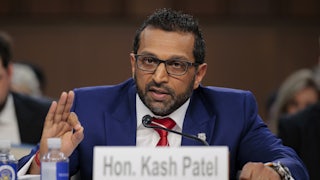As the plane prepared to depart from Newark International Airport, JD Goulet felt like “the earth was going to collapse beneath us before we got in the air.” Seated beside them was their wife, their son, and their son’s boyfriend, all three of whom are trans. The family was bound for Portugal, with no plans to return. Goulet, who is nonbinary, and their wife were both “covered in rings and necklaces and stuff shoved in our pockets,” Goulet said: “a bunch of hand-me-down stuff from her mom and my dad’s mom” to take to their new life. Everything else the family still owned was crammed into 13 suitcases. It was springtime in 2023. When the plane’s wheels lifted off the ground, Goulet exhaled, only then realizing that they had been holding their breath for a long time.
When the couple made the decision to leave the United States, they left behind their still-new home in Savannah, Georgia. Living in this “blue spot in a red state,” they told me, after living “in the red area of a blue state,” in eastern Washington, “gave me some of the awareness that nowhere is safe.” Goulet had been a board member of the region’s Planned Parenthood affiliate, joining not long after a health center in Pullman, Washington, was firebombed. In 2018, Goulet and their 15-year-old son had the unsettling experience of attending a March for Our Lives event while far-right group Patriot Prayer tried to hold a rally in the same location. Goulet ran for the Washington state legislature as a Democrat in 2016, 2018, and 2020, and ended up at the same tables as far-right state Representative Matt Shea, who at the time was planning a Christian nationalist homeland, following a “biblical” civil war. “I was raised in an evangelical church and went to evangelical private schools,” Goulet said. “I’m not a stranger to what they want and what they are willing to do.”
As time went on and the far right gained traction, the family discussed vague plans to leave the United States. Finally, on the night when a man broke into House Speaker Nancy Pelosi’s home and violently assaulted her husband, they knew it was time.
Today, more than two years after arriving in Portugal with their family and pets, Goulet is a volunteer with Trans World Express, a collaborative website created as a resource for other trans people considering emigration in this political climate. The site is made by those who have themselves left the United States, driven out by the normalization of anti-trans threats and attacks. As political scapegoating and anti-trans federal policies proliferate in the U.S., particularly in the second Trump era, demand for these resources is growing.
Some of the people Goulet has helped include Josephine Riesman and S.I. Rosenbaum. The couple contacted Goulet after President Biden’s campaign-ending debate performance last summer. Riesman and Rosenbaum had been talking about possibly leaving the country since at least 2020, Riesman told me. Even after she talked with Goulet, they briefly put their plans aside when Biden abandoned his candidacy in favor of Vice President Kamala Harris, giving the couple hope that Trump might yet be defeated. But a few weeks before the election, they started to get a bad feeling. It was hard to explain why, Riesman recalled. But she found herself saying, “We should call that lawyer; it wouldn’t hurt to have a backup plan.” Because Riesman is an author and Rosenbaum is a journalist and cartoonist, both have public profiles. Riesman is trans, and Rosenbaum is genderqueer. Whatever a second Trump administration would bring, they didn’t want to wait too long to find out and risk being unable to leave. When they did make the official decision to go, it was the week before the election, Riesman said. “We assumed there was already a huge line of people trying to get out of the country.”
Portugal was their choice because of better legal protections for LGBTQ people, and they were told Portugal’s visa process, though slow, was “incredibly straightforward.” It seemed unlikely they would get visas in the few weeks before Trump returned to the White House. There was also a whole logistical process involving the Agriculture Department to get their cats cleared to move with them. If they had to, the couple decided, they could go to Portugal as tourists, hope to get their visas later, return to the U.S. to retrieve them from the consulate, then reenter Portugal with the visas.
The visas came five days before their scheduled departure. Shortly after taking the oath of office, Trump declared that the U.S. recognized only the “biological reality of sex,” a way of stating that the federal government did not recognize the existence of transgender people. “Everything we heard on that first day was terrifying,” Rosenbaum remembered. Still, even given that, the couple are keenly aware that in the history of fleeing political repression, they’re comparatively privileged. “We weren’t leaving a war zone,” said Rosenbaum, nearly a year later. “We had money, we had each other.” And yet, “it was so hard.”
Knowing when to leave is a fraught question for anyone contemplating emigration. Some people face criticism even for considering leaving. Some feel talking publicly about leaving sends the wrong signal: that the situation in the U.S. is unrecoverable and unsurvivable.
“Fleeing the land of the free,” as termed by Jayesh Rathod, a law professor at American University researching trans Americans leaving the country, is not just a matter of a few individuals here and there. As conditions in the U.S. have deteriorated, he recently told me, “it became obvious that this was a phenomenon.”
“I asked, ‘What is the point at which you are going to decide that it’s time to go?’” Rathod said. “Several of them said, ‘We’ve already reached that point, what more do we need to see?’” They pointed to the administration’s restrictions on trans people using accurate gender markers on passports, its barring and separating trans people from the military, and to the Dobbs decision. While Rathod is still at work analyzing his interviews and didn’t want to quantify this, he said, “It just kept coming up, interview after interview, people saying, ‘I don’t want to wait too long,’” and making explicit references to Germany in the 1930s. “That framing,” he said, “was pervasive.”
Both Rosenbaum and Riesman come from families who have fled pogroms and the Holocaust. Rosenbaum’s uncle told people to get out in 1939, and “everyone thought he was crazy,” they recalled. The lesson Rosenbaum took from their Jewish heritage, they said, was, “(a) Be in solidarity with the other people who are getting picked on because you’re going to need their help, but (b) keep a bag packed and your eye on the exit.” Both Rosenbaum’s and Riesman’s mothers supported their decision to leave without question, which Riesman said was actually a bit frightening, even if it made the couple more confident they had made the right choice.
Goulet had a somewhat different experience. They weren’t that surprised when straight and cisgender friends “seemed to think we were just doing this for the fun and adventure—and just could not wrap their minds around the fact that like, Oh no, we don’t feel safe here, we’re fleeing.” Their dad asked if they were sure they weren’t just “overreacting.” What stung the most was some of their friends who were angry, they said, and who told Goulet they were “privileged” for being able to leave.
“There are ways I am privileged,” said Goulet. “I have white skin.” But they didn’t feel very privileged, they explained. While it absolutely takes resources to leave, they said, “I felt like it was a privilege to be able to stay, you know? If people felt safe enough and had good enough health care and secure enough employment to be able to stay, and weather whatever storm was coming, I felt like that was the privilege.” Goulet lost one of their work contracts not long after arriving and is still not working. Their wife is a veteran, they said, and the family is getting by with her V.A. pension.
Very few transgender people he spoke to over the course of his research, Jayesh Rathod told me, were making asylum claims, in large part because of the perception that the U.S. is a rights-abiding democracy and upholds the rule of law. Any country recognizing such asylum claims right now would be questioning human rights and international law norms that have held since the mid-twentieth century—despite this country providing fewer and fewer reasons to believe it is the beacon of freedom. So most people he spoke to were pursuing other pathways, whether emigrating for a job, obtaining a passive-income visa (as Portugal offers) or student visa or living with a spouse who is a dual national. “The informational networks that exist within the trans community around this are superb,” Rathod said, with “extremely well-developed” resources. “Folks that I talk to are pretty well educated about what will work and what won’t work for them.”
Even with the inarguable threats posed by the current administration, many still see promoting the idea of leaving as a tactically foolish admission of defeat, one that could harm people—especially transgender people—who are already living in precarity. Making that panic and isolation worse could be destructive. “I do sense a significant amount of panic,” Goulet told me. But they see a project like Trans World Express as a way to give people information, “to help people when they are in this state of fear,” and help reduce panic by laying out options.
As for how to know when it’s time to go, “That is something that each individual has to decide for themselves,” Goulet said. But if you are in the state of mind where you find yourself asking that question, they added, “you probably are already in the space where you should be making preparations.”








